#aasa Persia
Text

so i drew these @athensandspartaadventures kitty cats well over 3 months ago now but i finally bothered to SEND THEM to @en-theos to enjoy and they arrived safely so I can post them :) now go look at her ancient kitty cat art which occupies my thoughts always.
i used to draw cats and Only cats as a kid so it is always a weird time revisiting how to draw them now, and even moreso how to make them look like existing ocs. And I also rarely use markers lately (partly some dried up partly some lent out and not refilled and partly I forgor How and its not Fast like watercolour) but it was a fun challenge :)
sparta kitty is the only one who is modelled on a real cat (my dearly departed boy Ptolemy the Jerk Cat) although I now realize I forgot to draw the nick in his ear.
#athens and sparta adventures#aasa#aasa athens#aasa sparta#aasa ionia#aasa corinth#aasa persia#hapo art#ink#traditional art#classics
57 notes
·
View notes
Note
Hi Hapo, would you mind play the OC Askbox with Aasa characters? If so I would like 10 for everyone and 15 for Sparta.
[anon is probably referring to this meme on my main blog]
10. Free Space #1: Which of your OCs would be most likely to survive a zombie apocalypse? Which would die immediately?
I'll do a handful of the major characters, I don't know offhand what the more minor characters would do and I'd have to think about that longer, haha.
I mean, [spoilers] given how the great plague of Athens really instilled this sense of hopelessness and "every man for himself" and "dont care about other people because thats how you get infected", Athens would gain a handful of points on being self sufficient (but very quickly succumb anyway and get himself in some avoidable situation)
Sparta would refuse to acknowledge it was happening but wouldn't actually have any defenses against either the zombies or the hordes of people fleeing the situation to come take his resources, and of course he would no doubt have a helot uprising to deal with on top of that so he's already single-handedly fighting a losing battle just to look cool.
Corinth geographically would be in a secure position so long as the epidemic stayed local, and if things got dicey she would probably fuck off to Sicily or something.
Persia is a great shot and so long as he has the high ground or fast wheels he'd cut right through the zombies. His tendency to keep everyone at arms length but still rely on others for support would mostly serve him well (until he went in for a kiss or a hand hold with one of his chosen few elites who are Too Brave to admit they've been infected and omnomnom)
Ionia would be like, so busy trying to find a philosophical answer to who gets infected and why and she would get bit while arguing with some guy in the agora talking about how if we are just more righteous the whole thing will pass. (and maybe it wasn't even a zombie bite, i mean, you know how cynics are).
15. Is your character's first instinct fight or flight? Is there something that could force them to do the opposite?
Sparta's first instinct is "stand there and do nothing and stare" or "don't get involved in the first place", but I guess if say, we set him up on a road trip and he gets ambushed by a wolf or bandits or something, obviously he's going to fight because he does have a rep to uphold, even if he's going to lose.
Unless he sees them from a great enough distance that he chooses a stupid long route or turns around and goes back home, of course.
5 notes
·
View notes
Text

Based on this post.
@allbeendonebefore, plz tell me how close I was to your characters.
#aasa#athens and sparta adventures#allbeendonebefore#aasa athens#aasa sparta#aasa ionia#aasa miletus#aasa corinth#aasa persia
4 notes
·
View notes
Text
Persian War Wednesdays: 1.15-1.22
Or, How the Lydians and Milesians Became BFFs
Time to dredge up some OCs I rarely draw lol
So once upon a time the Lydians who you may remember from such fun and exciting hits as “good at horse warfare” and “invented coinage” decided to siege Miletus, and this siege took a few generations of their kings.
The plan was to leave buildings and homes untouched and torch all the crops and trees so that every year just before harvest the Milesians would be demoralized enough to consider surrendering. Lydia was playing the long game.
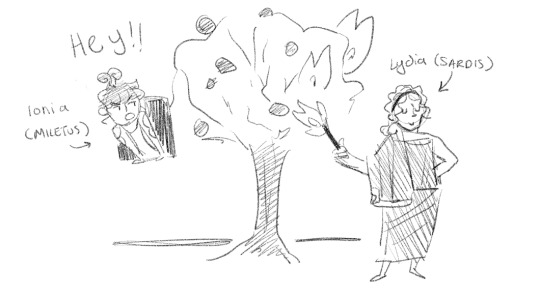
This went on for 11 years and Miletus didn’t receive help from any of the other Ionian Greeks (save for one bit they’d helped out earlier in a different war).
In the twelfth year, the Lydians accidentally burnt down a temple to Athena of Assesos when the wind caused fire to spread from the crops they were trying to burn. Mysteriously, the King of Lydia (Alyattes) came down with an illness.
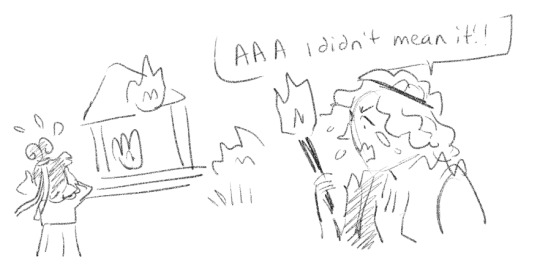
So off goes Lydia to the Oracle at Delphi which is where most people go to solve Mysteriously Coincidental Monarchical Maladies and the Oracle cleverly suggests Maybe You Should Rebuild That Temple You Burnt By Accident.
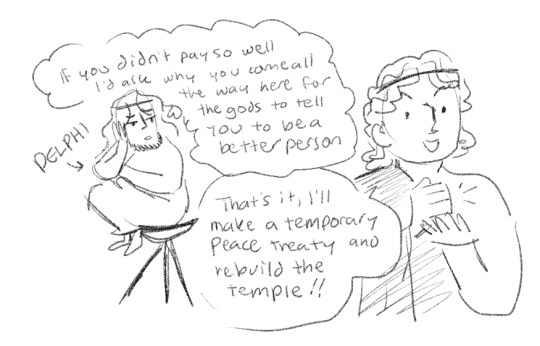
The Lydians get set to go ask the Milesians nicely if they are ok with not being sieged this year while they make reparations, they only wanted to starve them a little after all and they’re sure once this temple is fixed that they can go back to destroying their crops again!
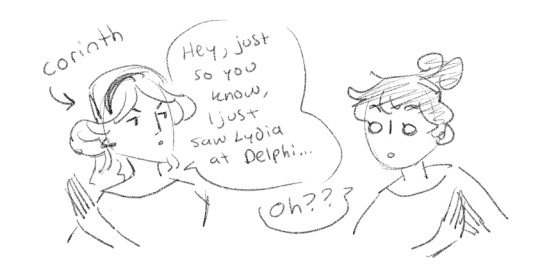
The Milesians, hearing that the Lydians are on their way, quickly gather up every scrap of food they have and pile it up in the middle of town right where the Lydians are going to be marching through...
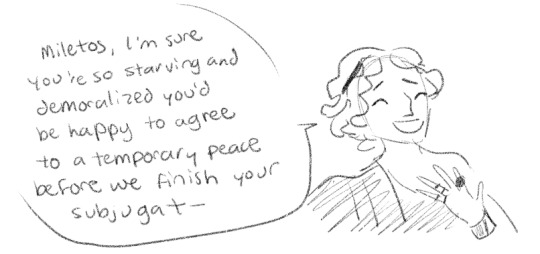
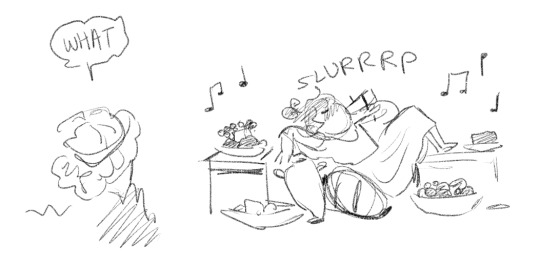
The Milesians threw a huge party with tons of food and drink and dancing, just like they totally, honestly, really seriously do all the time even when the Lydians have been setting fire to all their food.
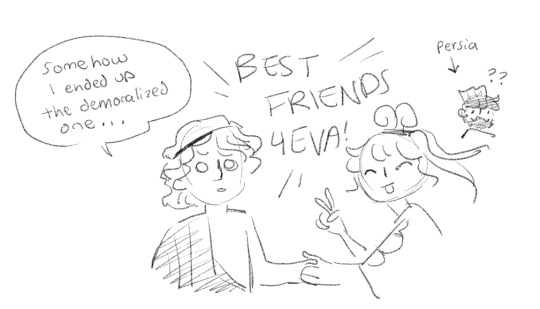
And thus the Lydians and the Milesians set aside their differences and became friends and allies (until Persia noticed how shiny Lydia was anyway).
Bonus:
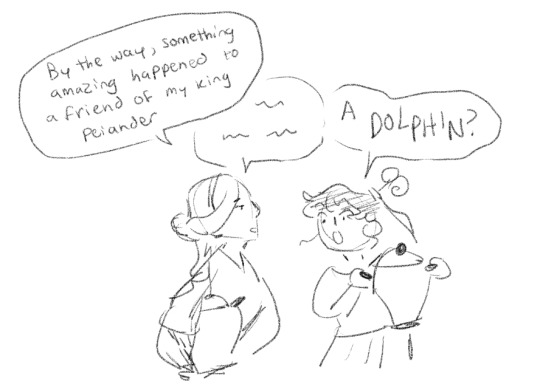
#hapo reads herodotus#hapo reads greek lit#ancientalia#aph ionia#aph miletus#aph lydia#aph corinth#hapo doodles#athens and sparta adventures#digital art#clip studio paint#aph persia#aasa persia
32 notes
·
View notes
Text
Tahanan
Sa Ika-21 ng Marso, iba't ibang kaganapan na ang naitala sa kasaysayan ng ating mundo. Kagaya ng pagpatay sa tatlong libong mga hudyo sa tahanan nila, ang unang pagkatuklas sa Africa, Ang sunog na pumatay sa isang libo at limang daang katao noon sa Japan, at ang pagpapangalan sa Persia bilang Iran; Mga kwento ng terorismo, patayan, at tagumpay sa iba't ibang parte ng mundo.
Ika-21 rin yun ng Marso nang magsimulang gumuho ang pader ng damdamin na kay tagal kong binuo. Pero hindi man ito naitala sa mga libro o sa mga artikulo. Hindi man naisulat sa bibliya ang ating pagtatagpo. Ni-hindi man nakita ng kahit sinong propeta ang kahahantungan nito ay nanalig at naniwala pa rin ako dito; sayo; sa tayo.
Kinabisado ko ang mapa ng daigdig na hindi pangmatagalan. Itinuring kitang tahanan dahil dito natagpuan ang 'tahan na' ngunit ito'y sa panandalian lamang pala. Ilang alaala na nga ba ang ating pinagsaluhan at ilan dito ang mga panahong umuwi ng luhaan?
Ilang beses na ang mga matang lumuluha, umiiyak, at humihiling sa alapaap, “kaunting minuto pa.” Na sa bawat kong paghaplos ay may pagsusumamo. at sa bawat kong pagkapit ay may sumisigaw ng mga salitang hindi pwedeng bigkasin ng aking bibig, "manatili ka muna sa aking tabi. Pahiram ng iilan pang mga sandali"
Ngunit ang bawat hakbang mo papalayo ay walang kasing bigat sa aking dibdib. Ang bawat halik mo ng pamamaalam ay yumayanig na nagdudulot ng pagguho sa abandonadong gusali ng pag-ibig.
Kailan ito hihinto? ilang beses ka nang umalis at bumalik pero tinanggap kita ng buo? Ilang beses ka pang aalis at babalik at tatanggapin pa rin kita ng buo? ILANG BESES KA PANG AALIS AT BABALIK PERO TATANGGAPIN PA RIN KITA NG BUO?!!
Ngunit ang pag-ibig ay ang uri ng pagbibigay na hindi ka mag-aantay ng sukli.
Sa pag-ibig, wala sa usapan kung kaya ka nya rin bang mahalin pabalik.
Pero maniniwala ka pa rin dito.
at aasa na sa susunod na pagtagpuin muli kayo ng tadhana ay masimulan muli sa umpisa, at sa pagkakataong yun sana ang katapusan ay hindi n’yo na makita pa.
3 notes
·
View notes
Note
Yes that meme's what im referring to many thx! Oh I love your answer Corinth running to Syracuse (i guess) for help is so cute and Persia's reaction is definitely the coolest (cooler than all Greeks) but watch out for your beloved subjects Persia :-D Also love the awkward way Sparta reacts to whatever immediate crisis lol. Would you mind also do 17 for Athens and 18 for major characters in aasa as well? I'm curious for your characters and really find your headcanons lovely.
for sure! and thank you :) i'm glad you enjoy them!
17. Is your character holding any grudges? Are they likely to stop?
I guess in a way the plot of AaSA is Athens's grudges, haha, he will remember something minor from the bronze age that doesn't really matter, but then he's also kind of flippant and forgets a lot of things, both his own actions and those of others. I think he's more likely to make up a grievance almost on the spot by chapter 5, though he doesn't really keep track of them (as opposed to Persia, who had to remind Darius at every meal not to forget his grudge against Athens, lol)
18. If your character were trapped on a deserted island, what three things would they want to have with them? Which person would they absolutely hate to be trapped there with? Which person would they enjoy being trapped there with?
Athens, salesman that he is, would want tons and tons of olive oil (multi purpose! long term storage! shiny skin and hair!), which of course comes with pottery, so a stylus to scribble on any potsherds (accidents and ostracisms would of course happen!) would probably come in handy, and the delian league members are kind of like objects rather than people right? and...
Sparta would want his comb (and begrudgingly borrow some of Athens' oil), probably the thicker of his two cloaks (you never know), and a musical instrument of some kind (likely his pipes).
Corinth would probably want a weighing scale (someone is going to have to set up a currency on this island), her hair dye or at least her bleaching hat (hours and hours of sunlight on a desert island? she couldn't waste All of them), and she'd probably take some expensive bauble in her collection to barter for passage off that rock.
Ionia would probably want something to read (not practical, but at least no one can enforce what she can or can't do on a desert island), maybe some kind of navigation device antikythera mechanism?, and maybe some seeds or something? idk if she actually knows how to plant things but I think she'd have like, Too Much confidence.
Persia would probably want like, a nice drinking cup or bowl (hes not going to be humiliating himself drinking with his hands), uh, does his bow and arrows count as an object? at least the bow, what if there's wild game on this island etc. Much as he loves his cats, i don't think he'd want them there to end up as food, so he'd probably want something practical like a pot to make stew or tea with for his little bowl, haha. I think despite his reputation he was quite self sufficient in his youth.
Everyone would hate being stuck with Athens, but I think he wouldn't mind being stuck with the others because he thinks of most of them as "friends"...(though with Persia it's like "if you die, i'm going to eat you!"). Sparta and Corinth would initially not mind each other, but then they'd get into such big arguments about whether to wait for help or to try to do something that they'd be at each other's throats in no time. Persia would probably like someone like Sardis or Ionia there to talk to (the others would be too busy arguing or being petty to work with him).
#Anonymous#hapo rambles#man i should draw corinth's silly bleaching hat in the upcoming chapter...#hapo replies#aasa sparta#aasa athens#aasa corinth#aasa ionia#aasa persia#aasa meta
4 notes
·
View notes
Photo
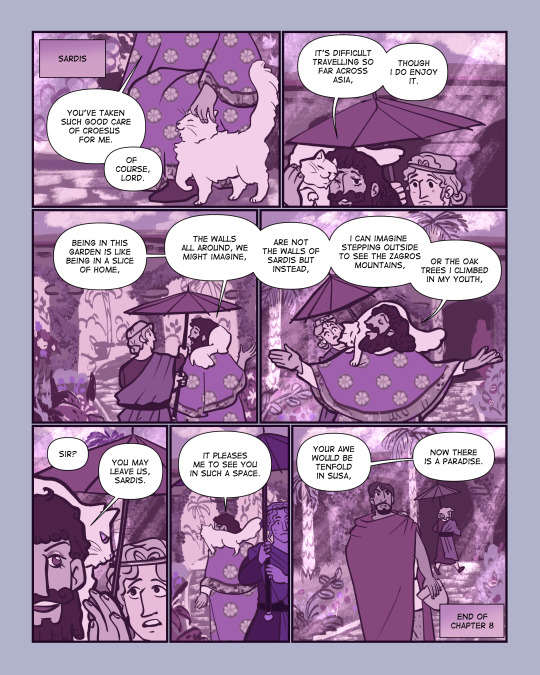
Athens and Sparta Adventures: Chapter 8: Book of Ships pg. 25
[previous] [contents] [next chapter]
Quick Ref:
Croesus: Former King of Lydia. According to Herodotus, the king escaped the pyre he was to be burned on after the Persians captured Lydia and became the advisor to Cyrus the Great, who seemed to keep him around because he was amused by his advice. Likewise, Persia named a cat after him out of amusement.
Susa: One of the four capital cities of the Persian Empire and the terminus of the Persian Royal Road from Sardis as well as one of the most important cities in the ancient Near East.
Comments:
We’re finally at the end! I’ve had this plot point in my head for years and I finally put it to “paper”, so to speak. It turns out Persia was doodling around Miletus waiting for someone :)
Persia wasn’t born into opulence, in fact he was a bit of a rough and tumble kid who grew up in the mountains. I think unlike Sparta he used that background to develop an appreciation for the finer things - where Sparta grew up in one of the more lush and fertile areas of Greece and still makes excuses to deny himself luxury (apart from doing absolutely no work or skill to support himself and depending on the labour of others).
#athens and sparta adventures#historical hetalia#aasa sardis#aasa persia#aasa sparta#aasacomic#aasachp8#hapo art#digital art#clip studio paint
19 notes
·
View notes
Photo
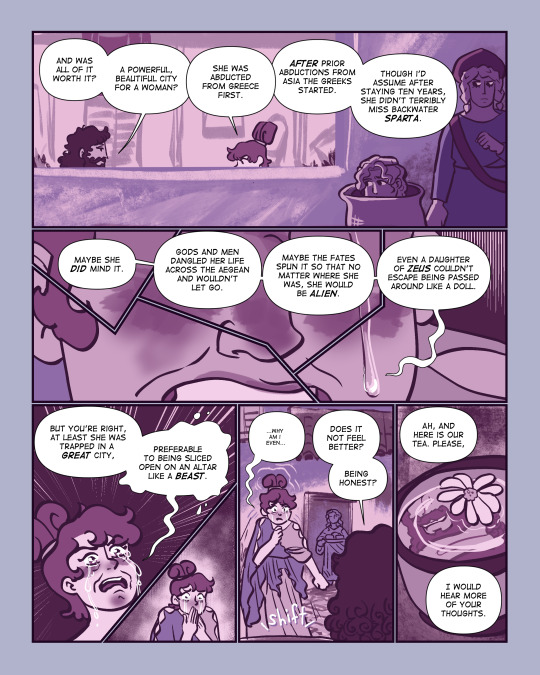
Athens and Sparta Adventures: Chapter 8: Book of Ships pg. 21
[previous] [contents] [next]
Quick Ref:
Io: Daughter of Inachus, a princess who was (according to Herodotus) abducted from Argos by the Phoenicians. (This is the same Io who was disguised as a cow by Zeus.
Europa: A Phoenician princess abducted by Greeks (prior to her abduction to Crete by Zeus... disguised as a cow. I’m sensing a theme here.) According to Herodotus’ Persian contacts, Europa’s abduction was the second incident that led up to the Persian Wars.
Comments:
I discussed the parallels between Ionia and Iphigenia last chapter, and since there are parallels between Helen and Iphigenia I thought I’d throw them all together in a salad of Greek Women Experiencing a Significant Lack of Agency. Mmm. Would you like some Death of the Maiden on that? (Tell me when...)
Anyway Persia called it and has confirmed that this is a sensitive subject for Ionia/Miletus. But he’s also (I think) trying to be a little less dismissive than Athens would be towards her feelings and coax her into continuing to express herself because... he’s not the Bad Guy, unless? :)
I just get the sense he likes messing with people.
But they’re having chammomile tea to relax :3
#aasa persia#aasa ionia#athens and sparta adventures#aasa halicarnassus#aasa sardis#digital art#clip studio paint#aasachp8#aasacomic
14 notes
·
View notes
Photo
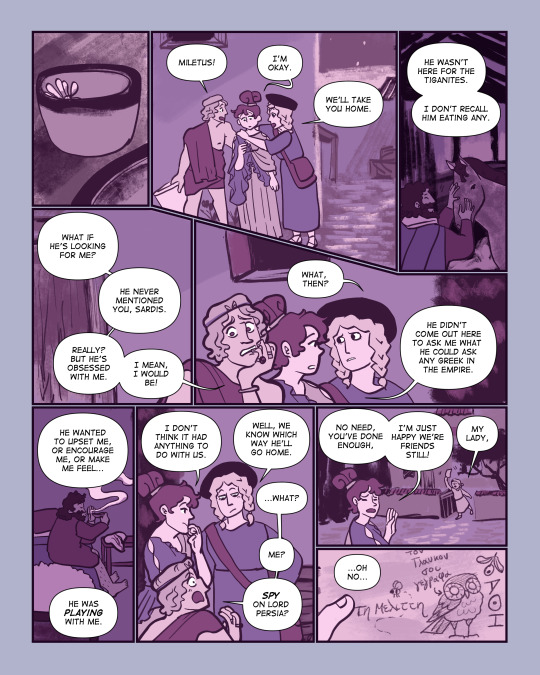
Athens and Sparta Adventures: Chapter 8: Book of Ships pg. 23
[previous] [contents] [next]
Quick Ref:
Chamomile: Greek for ‘earth apple’, isn’t that funny? Anyway these flowers were used in Ancient Greece and elsewhere for their medicinal properties, and we still drink chamomile tea to soothe anxiety, sleeplessness, and stomach aches. I say we, but chamomile is actually one of the few teas i really don’t like the taste of.
Melissa: A given name that is derived from the Greek for honeybee. In the Attic dialect, Melissa becomes Melitta. I’ve used it in the past as Athens’ nickname for Ionia/Miletus (though the bee was actually the symbol of Ephesos).
Comments:
The Ancient Greek reads (hopefully) “To Honeybee” and “I drew Glaukon for you”. AΘΗ is an abbreviation for Athens as seen on its coinage.
It’s been well over a century but Sardis is still a bit self absorbed from inventing coinage and being Persia’s “favourite”. At least, he Thinks he’s Persia’s favourite. Right...?
Ionia was the one who confronted Persia in the first place so he probably had already eaten and just needed to upset her enough to distract her from whatever he was actually up to. He loves pancakes, really, it’s just he couldn’t eat another bite. Especially while playing psychological games.
As I said I think while they’re close friends that Sardis and Halicarnassus would probably still think twice about betraying Persia for Ionia.
#athens and sparta adventures#aasacomic#aasachp8#aasa persia#aasa ionia#aasa miletus#aasa halicarnassus#hapo art#digital art#clip studio paint
12 notes
·
View notes
Photo
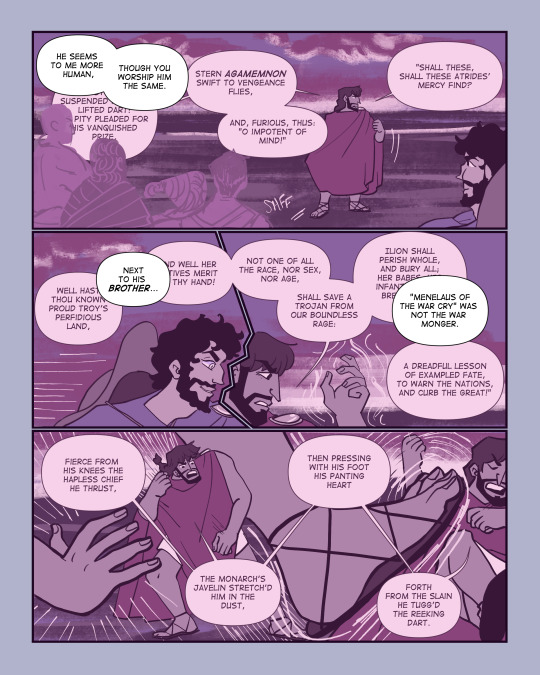
Athens and Sparta Adventures: Chapter 8: Book of Ships pg. 20
[previous] [contents] [next]
Comments:
Something something [hits you over the head with the Athens and Sparta vs Agamemnon and Menelaus parallels i’ve only briefly thought through]
Likewise what I said about the Spartan mirage the other page- I think one of the central thesis statements of AaSA from the beginning has been disputing the pop culture image of Sparta as the militaristic warrior and Athens as the quiet patron of the arts. I try to turn that on its head wherever I see it.
Oh, and this is from Book 6 of the Iliad and not actually the Book of Ships but... clearly. they’re on a ship towards asia minor so. hehe.
Since I used Pope’s translation for the final draft, here’s another version with Lattimore’s as with the prior page.
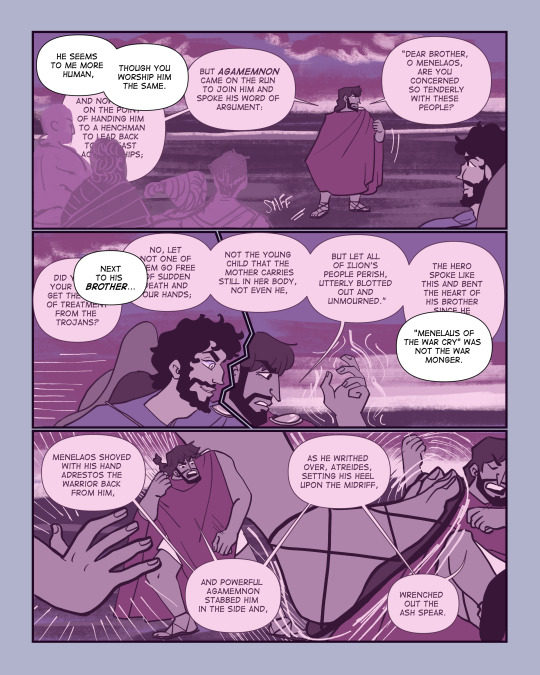
#athens and sparta adventures#aasa athens#aasa sparta#aasa persia#aasachp8#hapo art#digital art#clip studio paint#aasacomic
13 notes
·
View notes
Photo

Athens and Sparta Adventures: Chapter 8: Book of Ships pg. 19
[previous] [contents] [next]
Quick Ref:
Kleos: The Greek concept of “glory” literally means “loud” referring to what is heard about a person. You see bits of it in a lot of famous Greek names such as Heracles, Cleopatra, and Patroclus. Like family curses, kleos is somewhat hereditary.
Menelaus: The brother of Agamemnon, husband of Helen, and mythical king of Sparta. Menelaus is often depicted as somewhat more hesitant and possibly more compassionate than Agamemnon.
Comments:
The flowers in these panels are oleander, which I just drew because I thought it was pretty and gegographically appropriate, but it does retain some spicy meanings in retrospect. It features in the story of Leander, who was found holding the flower by his lover after being dashed against the rocks crossing the Hellespont to see her. It’s also Extremely Deadly, every bit of the plant is poisonous, so it retains that “beware” vibe in floriography.
I think it’s really interesting to consider what Cartledge calls “The Spartan Mirage”, that is, all the collective “information” or lack thereof that makes up our concept of what Sparta is and what it was like. Pieces of that mirage are formed by Sparta’s role in epic literature such as the Iliad, and Sparta’s image as a military state is somewhat tempered with this scene of Menelaus being supplicated and ready to show mercy. It forms an interesting parallel with Sparta’s reputation in modern pop culture and Sparta’s actual reported foreign policy, which seemed to primarily be “stay home and don’t do anything until literally the last minute”.
I ended up using Pope’s translation here for the lyrical quality, but here is an alternate version of this page with Lattimore’s translation which is a more... direct translation?
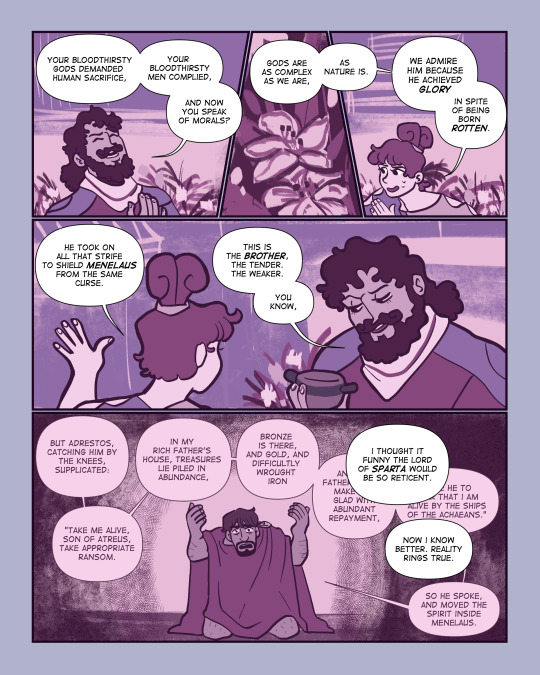
#aasa#athens and sparta adventures#aasa persia#aasa ionia#aasa miletus#aasa sparta#hapo art#digital art#clip studio paint#aasachp8#aasacomic
14 notes
·
View notes
Text
I may have forgotten some but hey look I have polls
13 notes
·
View notes
Photo

Athens and Sparta Adventures: Chapter 8: Book of Ships pg. 16
[previous] [contents] [next]
Quick Ref:
Heroon: A shrine dedicated to the cult worship of a hero, such as the Menelaion in Sparta dedicated to Menelaus. The concept of the ancient Greek ‘hero’ is rather different than the modern conception; a hero was a person of noble birth who lives and dies pursuing glory and not necessarily one who did ‘good’ deeds.
Zoroastrianism: One of the oldest continuously practiced religions in the world and the most popular religion in the Persian Empire at the time.
Comments:
There was no particular inspiration for the depiction of Agamemnon here because I wanted to get the composition right and depict him holding both his scepter and a spear, but the depiction of Menelaus and Helen is based off a black figure amphora by the Vatican Painter ca. 530 BCE. The story goes that after recovering Helen, Menelaus threatened to kill her for her infidelity at which she begged forgiveness.
I feel like even if Persia didn’t have a particular relationship with Troy and was far from being an empire at the time Bronze Age Troy was razed that he is taking personal interest into the contemporary use of Troy to represent Asia In General and Therefore Indirectly Referencing Him.
We also get a very small peek into Persia’s opinions, which he usually is much more private about. This may be an oversimplification of Zoroastrian beliefs on my part, but I guess I’m also recognizing that Zoroastrianism did influence the Abrahmic religions in particular ways that may carry over to our own understanding.
I also think in modern cultural reception (and I have made this mistake myself back in my first year of uni!) we tend to understand Achilles as the “hero” and Agamemnon as the tyrant, the despot, the no fair bad antagonist man, and that’s not how the Greeks would have considered them.
That all said, there’s a cultural shift that will be starting to happen on the streets of 5th century Athens that reconsiders the morality of these stories... but who’d be talking about stuff like that...
#athens and sparta adventures#historical hetalia#aasa persia#aasa ionia#aasa miletus#aasa athens#clip studio paint#digital art#aasacomic#agamemnon#helen#menelaus#aasachp8
31 notes
·
View notes
Text

Have a day off today so I basically took the last four hours to just sit comfortably and doodle (while watching videos of people sketching for inspo) and it was super relaxing. There's even a couple redraws from chapter one and two if you squint.
#aasa art#aasa athens#aasa sparta#aasa corinth#aasa miletus#aasa ionia#aasa persia#aasa greece#i know right even greece showed up and i remembered why im obsessed with her oops#aasa argos#aasa thebes#aasa delphi#aasa laconia#aasa attica#traditional art#ink
27 notes
·
View notes
Photo

strut it out
walk a mile
serve it
ancient city style
#this song lives in my head rent free etc etc#ancientalia#historical hetalia#digital art#clip studio paint#aph athens#aph sparta#aasa athens#aasa sparta#aasa persia#aasa ionia#aasa miletus#hapo art
38 notes
·
View notes
Photo
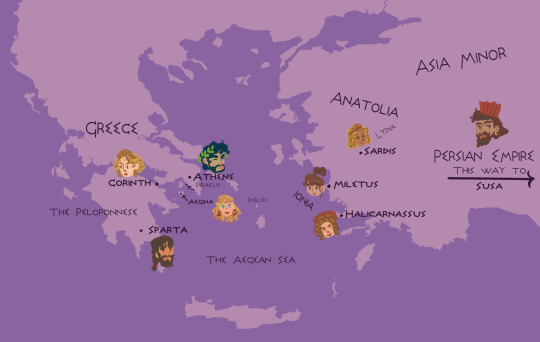
Welcome to Athens and Sparta Adventures!
[ Chapter 1 ] [ table of contents ] [ recap ] [ Chapter 8 ]
Reference map for Chapter 8 of Athens and Sparta Adventures. Characters may be added as they appear or are mentioned in the chapter.
It’s not exactly clear what the borders between Greek territory in Ionia and the Persian Empire begin or end (especially since I only have a loose date in the 440s BCE for the chapter), but theoretically Ionia is under Athenian control. Sardis remains firmly in the Persian Empire while Halicarnassus may still be part of Persia or may have joined the Delian League, it’s not entirely clear. The Persian Royal Road extends from Sardis to Susa.
Most of the action in this chapter takes place in Miletus and at the Piraeus harbour near Athens.
New Readers: please note that this comic is not mobile friendly. Some directory links such as the table of contents only work on desktop, mobile users should still be able to navigate using the bolded links above. I started writing this comic back in 2011 and reuploaded it to tumblr around 2018, which is why there’s significant gaps in both my consistency as a creator and in the changes in usability on this hellsite.
See below for brief Character Bios
Characters of Note
MAJOR CHARACTERS
Athens - The arrogant, egotistical and hubristic almost-capital of Greece. Athens’ more legitimate claims to hegemony are primarily his large navy and alliance of islands and city-states throughout Greece that purports to defend Greece from future Persian incursions. Although he is entering what we know as the “Golden Age” while the Parthenon and other such major renovations are nearing completion, Athens seems somewhat preoccupied with his vacation...
Sparta - Known as Greece’s greatest warrior despite rarely finding reason to leave home on time, Sparta is uneasily resting after emerging somewhat victorious from the First Peloponnesian War. Although accepting a thirty year period of peace with rival Athens, Sparta finds the upstart city-state’s obsession with ‘democracy’ and the growing excuses to coerce new alliances increasingly worrisome.
Corinth - The rich merchant city-state of Corinth has a vested interest in decreasing Athens’ power. Despite recently recovering her daughter-city of Megara, Corinth still finds others’ loyalties to her being tested. Frustrated by Sparta’s unwillingness to act on her warnings, Corinth suspects that a thirty years peace will do even less to stave off war in Greece.
Miletus (Ionia) - Athens’ niece, recently recovered from Persia’s possession after nearly a century after the Peace of Callias. Having spent some time living with her uncle again, Miletus is concerned that Athens’ execution of power are more and more resembling the systems employed by Persia. Having seen her former despot in her city despite the agreement that Persia should stay three days ride from the coast, Miletus has decided to confront him...
Persia - Currently the greatest power in Asia with territory stretching from Egypt to India, Persia has tentatively given up a direct assault on mainland Greece after wasting a lot of time and resources that seems to have accidentally united the disparate city-states against him. Instead, Persia has taken a back seat in his political interference, now preferring words and funds as weapons of choice.
MINOR CHARACTERS
Sardis - A wealthy city-state in Asia Minor, formerly the capital of the kingdom of Lydia which was conquered by Persia’s first king Cyrus over a century prior. Now, Sardis is the administrative centre for that region of the empire and the terminus of the Persian Royal Road from Susa. Despite this, Sardis demonstrates some concern for his rival-turned-friend Miletus in the decade after her exit from the empire.
Halicarnassus - the hometown of the so called “Father of History” (currently abroad in Athens) and also one of Miletus’ colleagues under Persian rule. Halicarnassus’ current allegiances appear to be a mixed bag, having helped lead an attack on Athens at the Battle of Salamis on behalf of Persia.
Laconia - Sparta’s wife, representing the surrounding territory and specifically the Perioikoi employed to support the elite class of Spartiate warriors. Laconia is concerned about Sparta’s frequent trips from home into enemy territory as the polis (or the five villages in a trenchcoat. chlamys?) has no walls to defend itself from attack. On top of a recent earthquake and uprising of the enslaved Helots, Laconia is also concerned that too many Spartans have conceded to Persian bribery in recent times.
Aegina - An island city-state with a longstanding grudge and rivalry against Athens. Aegina was the real naval power behind the earlier battle of Salamis rather than Athens, or so she claims. Although subject to the Athenian empire these days, Aegina is still well equipped with a few sharp jabs at Athens’ expense...
#historical hetalia#hetalia oc#ancientalia#aasa athens#aasa sparta#aasa persia#aasa miletus#aasa ionia#aasa corinth#aasa sardis#aasa lydia#aasa halicarnassus#hapo art#digital art#clip studio paint
22 notes
·
View notes